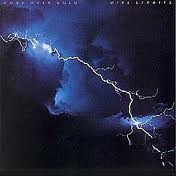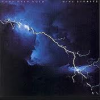 Originally published by L.S. Media. September 19th 2012.
Originally published by L.S. Media. September 19th 2012.
When someone thinks of Dire Straits with a 21st century perspective, invariably the first thought that gets conjured up is of the period of 1985 when they released the seminal and defining album of their career, Brothers in Arms. Whilst this album holds the affection of the dedicated and casual fans alike, it was the previous album, the 1982 release of Love Over Gold that firmly sets the band on course for the superstardom that was to follow.
The progression of the albums, from the 1978 self titled debut, past Communiqué and Making Movies saw the band become one of the best bands of the time; Love Over Gold cemented that fact. It certainly can be said that if this album had not as been well received Brothers In Arms may not have happened and the C.D. explosion that followed because of the sounds that album had on it may have been set back by a couple of years.
The album also saw the band hit the number one spot for the first time in their native U.K. It was to be the first album in a run of three that would gain the coveted top spot and it was a position that the band richly deserved.
In a way it’s possible to look at Love Over Gold as an album of two halves. The more personable B side with the three tracks of Industrial Disease, the title track of Love Over Gold and the fitting It Never Rains against the two lengthy but ultimately pure Straits sound that showcased just how good they were as a band and how in tune, on record at least, the five members were with each other. The opening two tracks of Love Over Gold are the storm before the fun, the joy of sitting out in an British thunderstorm before the sun comes out and yet these two songs are amongst the very best the band produced.
Telegraph Road tells the story of a city from its infancy and grass roots to the horror of modern day living with its lack of work and the deficit of opportunities. Based on a journey lead guitarist and vocalist Mark Knopfler took whilst on tour the song is epic, it is the story of the dream of hope being beaten by the might of wasted industrialism and dreams being killed. The song starts of in almost silent refrain, each instrument used only just audible which reflects the quietness the unnamed man at the start of the song finds. The peace and solitude is attainable it seems but eventually spoilt by humanity’s need to congregate and be together.
Telegraph Road stands out, not just for the length of its song, an astonishing 14 minutes and 18 seconds, not just for the fact that the song rarely gets played in its entirety on radio stations but also for the narrative and its use of time and distance. A rare exception of a song being powerful enough to make you think in terms of the people that have lived and worked along the old Saginaw Trail, the history behind a song rather than the tune itself. Although the song is punctuated by long periods of top quality music, it is the lyrics that make the song and gave the band perhaps their first foray into the world of Progressive Rock.
The second song on the album follows suit in terms of the grainy sepia toned image you get when listening to it but turns it on its head by making the music the important factor of the song.
Private Investigations has the feel of black and white detective stories, the ultimate film noir exposition into the world of music. It is impossible to think of this song without the smell of a lady’s perfume whispering past your nose, the taste of cheap watered down bourbon and Sam Spade sitting in the corner narrating the lies that the woman or man has told you. The keyboards are atmospheric and sultry but with the knowledge that there is danger in looking too hard into a matter that in the end doesn’t concern you. Mark Knopfler’s voice carries throughout the song, and made better for speaking the words of the man rather than singing them. It adds to rather than neglects and makes side A, albeit only two songs long, one of the most outstanding 20 minutes in music of any genre.
What makes Love Over Gold even more remarkable as an album is what is missing from the finished product. Yes it has Mark Knopfler’s brilliant guitar playing that had seen Dire Straits get the foothold into the pantheon of band’s of the 1980’s, it also had the great Alan Clark giving perhaps his greatest performance on a Dire Straits album but it the song that got away from the album that is more intriguing. Private Dancer was scheduled to be included on Love Over Gold but Mark Knopfler decided against its inclusion on the basis that the lyrics weren’t suitable for a man to sing. Of course it could be argued that he was proved right but with Tina Turner re-recording it with several members of the band and Jeff Beck replacing Mark Knopfler, it became a world-wide hit , and one of the most well-known songs of Tina Turner’s career.
If this song had been included on Dire Straits’ Love Over Gold at the expense of one of the five other tracks that make this album unique then the record arguably wouldn’t have had the same appeal.
Although Brothers In Arms is considered by many to be the best Dire Straits album made, Love Over Gold is Bold, well produced and sounds great, a worthy album to be included in a strong decade of music as one of the finest.
Ian D. Hall
